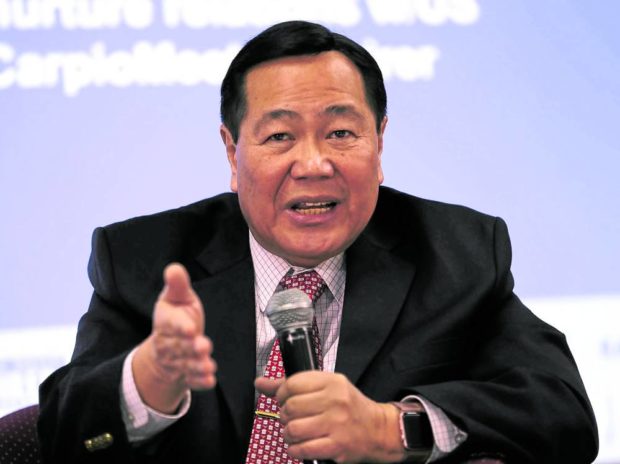Retired SC exec: PH still has obligation to cooperate with ICC probe

JUNE 05, 2017
In this file photo, then Supreme Court Senior Associate Justice Antonio Carpio answers questions from the Inquirer multimedia editors and reporters during the Meets Inquirer Multimedia program held at the Inquirer office in Makati City.
INQUIRER file photo / EDWIN BACASMAS
MANILA, Philippines — The Philippines has the obligation to cooperate with the International Criminal Court (ICC) regarding its investigation into violations committed by former President Rodrigo Duterte in connection with his bloody war on drugs.
“Let me just point out the decision of the Supreme Court (SC) on this, sabi ng Supreme Court, while the withdrawal of the Philippines from the Rome Statute and ICC took effect at a certain date, the Philippines has the obligation to comply, to cooperate with the ICC for acts committed before we withdrew,” retired Supreme Court Associate Justice Antonio Carpio told reporters Wednesday.
Carpio was referring to the 2021 case of Pangilinan et al. vs. Cayetanon et al. where the Supreme Court dismissed the petitions that sought to declare as invalid the Philippine government’s withdrawal from the Rome Statute of the International Criminal Court (ICC).
READ: SC dismisses plea seeking to declare as invalid PH’s withdrawal from ICC
“We have the obligation to cooperate because these are crimes which were allegedly committed before we withdrew. It is our obligation. I am just quoting the Supreme Court decision,” Carpio said.
The same 2021 ruling, which was penned by Senior Associate Justice Marvic Leonen reminded the Philippine government that “withdrawing from the Rome Statute does not discharge a state party from the obligations it has incurred as a member.”
READ: Duterte can’t evade ICC, end treaty on his own
“Consequently, liability for the alleged summary killings and other atrocities committed in the course of the war on drugs is not nullified or negated here,” the SC said.
The country is no longer a State party from the ICCs Rome Statute. On March 16, 2018, the Philippines submitted its notice of withdrawal from the Rome Statute after the ICC prosecutor opened a preliminary examination into Duterte’s crimes against humanity.
The withdrawal became official on March 17, 2019.
There are calls for the government to cooperate with the ICC after Duterte admitted on national television that he used confidential funds to finance his crackdown against people involved in illegal drugs.